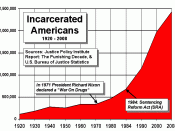Juvenile Justice: Should Minors be charged as Adults?
A movement has taken hold of our nation to change the juvenile justice system, and erase any distinction between young offenders and adult criminals. Almost all fifty states have changed their juvenile justice laws, allowing more youths to be tried as adults and scrapping long-time efforts to help rehabilitate delinquent kids and prevent future crimes. It seems to be plain and simple, a minor in this country is defined as a person under the age of eighteen. How then can we single out certain minors and call them adults? Were they considered adults before they carried out an act of violence? No. How then, did a violent act cause them to cross over a line that is defined by age? The current debate over juvenile crime is being dominated by two voices: elected officials proposing quick-fix solutions, and a media more intent on reporting violent crimes than successful prevention efforts.
Minors should not be tried as adults in our society today. This is obvious through looking at propositions by our government such as Proposition 21, statistics on juvenile crime and also from specific cases where minors where sentenced in adult courts.
Politicians feel that best and easiest solution is to simply lock up youth offenders for long periods of time, and ignore rehabilitation. Most studies demonstrate that putting young offenders in adult prisons leads to more crime, higher prison costs, and increased violence (Cooper, 1997). Yet, we are spending more and more on corrections, and less on prevention efforts. Some states spend more on corrections than they do on higher education. The cost of keeping juveniles in prison as compared to putting them into rehabilitation programs is astronomically higher. The Average cost of incarcerating a juvenile for one year is between...



Int.
I didn't come looking for this paper but it did catch my eye as an interesting subject and i found it to be a good read, im sure it will be helpful to anyone needing such information. thankx
14 out of 14 people found this comment useful.